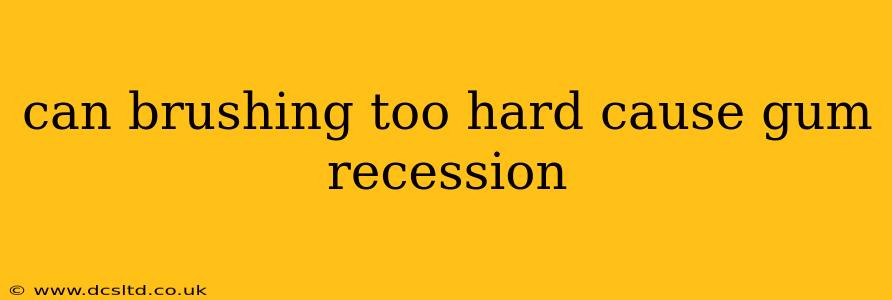Yes, brushing your teeth too hard can absolutely contribute to gum recession. This is a significant concern because gum recession exposes the roots of your teeth, making them more vulnerable to sensitivity, decay, and even tooth loss. Understanding the mechanics of gum recession and adopting proper brushing techniques is crucial for maintaining healthy gums and a beautiful smile.
What is Gum Recession?
Gum recession is the process where your gums pull back from your teeth, exposing more of the tooth's root surface. This gradual process can happen slowly over time, often going unnoticed until significant recession has occurred. While several factors can contribute to gum recession, aggressive brushing is a major culprit.
How Does Aggressive Brushing Cause Gum Recession?
The abrasive action of brushing too hard, particularly with a hard-bristled toothbrush, damages the gum tissue. This damage doesn't happen overnight; it's a cumulative effect of consistent, forceful brushing. The abrasive force wears away the gum tissue, causing it to recede. Think of it like sandblasting your gums – the constant friction gradually erodes the protective layer.
What are the signs of gum recession?
- Noticeably longer teeth: One of the most obvious signs is that your teeth appear longer than they used to.
- Exposed tooth roots: You might see a yellowish or darker area at the base of your teeth where the roots are exposed.
- Sensitive teeth: Exposed roots are more sensitive to hot, cold, sweet, or acidic foods and drinks.
- Bleeding gums: While bleeding gums can have other causes, it can also indicate gum damage from aggressive brushing.
- Loose teeth: In advanced cases, gum recession can lead to loose teeth.
What Other Factors Contribute to Gum Recession?
While aggressive brushing is a significant factor, it's not the only one. Other factors that can contribute to gum recession include:
- Genetics: Some individuals are genetically predisposed to gum recession.
- Periodontal disease (gum disease): Gum disease is a major cause of gum recession. Infections and inflammation break down the gum tissue, leading to recession.
- Teeth grinding (bruxism): This habit puts excessive pressure on the gums and teeth.
- Misaligned teeth (malocclusion): Improper tooth alignment can contribute to uneven pressure on the gums.
- Smoking: Smoking impairs blood flow to the gums, hindering their ability to heal and making them more vulnerable to recession.
- Hormonal changes: Fluctuations in hormones, especially during pregnancy and menopause, can affect gum health.
How Can I Prevent Gum Recession Caused by Brushing?
The most effective way to prevent gum recession from brushing is to adopt proper brushing techniques:
- Use a soft-bristled toothbrush: Soft bristles are gentle on your gums and still effectively clean your teeth.
- Brush gently: Use short, gentle strokes rather than scrubbing back and forth aggressively.
- Brush at a 45-degree angle: This angle allows the bristles to reach under the gum line effectively without damaging the gums.
- Don't brush too frequently: Brushing twice a day is sufficient; over-brushing can counteract the benefits.
- Use fluoride toothpaste: Fluoride helps strengthen tooth enamel and protect against decay.
How to tell if you're brushing too hard?
You might be brushing too hard if your gums frequently bleed, are sore after brushing, or if you notice any wear and tear on your toothbrush bristles (other than the natural bending of the bristles).
What should I do if I think I have gum recession?
If you suspect you have gum recession, schedule an appointment with your dentist or periodontist immediately. Early diagnosis and treatment are essential to prevent further damage and maintain your oral health. They can assess the extent of the recession and recommend appropriate treatment options, which may include:
- Scaling and root planing: A deep cleaning procedure to remove plaque and tartar from below the gum line.
- Gum grafting: A surgical procedure to replace lost gum tissue.
- Guided tissue regeneration: A procedure that encourages the regrowth of gum tissue and bone.
By understanding the causes and prevention methods, you can actively protect your gums and maintain a healthy smile for years to come. Remember, gentle and proper brushing techniques are crucial in preventing gum recession and maintaining optimal oral health.
